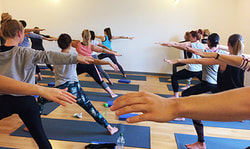|
I'm regularly asked to help people choose a Yoga class that will suit them. There are lots of styles, and flavours on offer in Bristol, so here are a few pointers and guidelines to help get you started: Please feel free to get in touch for more information. Why Yoga?Different styles of yoga offer different degrees of either physical or mental challenge and discipline or more entertainment (music etc.). What are you interested in initially? Do you want to get fit, find some calm and mental space, learn how to meditate, reduce stress, lose weight, reduce stiffness, become more grounded and centred, ease tension, aches and pains, relax more, have a physical or emotional injury that you want to improve, explore something beyond everyday life? Yoga can do all of this and more. Your personal interests will help direct which class would be most suitable. See the styles of yoga below to see where you might want to start. Try some yoga classesThere isn't really any substitute for trying the class to see if you enjoy it and get along with the teacher as it is such a personal experience. Even if your friend loves the class, it just might not suit you. Try classes out until you find one you really want to go back to. Most yoga teachers are happy for you to come along and try their class and see if it is right for you. You are much more likely to stick with it if you find a class and a teacher you are happy with. Classes vary hugely, so don't be put off from yoga if you go to a class and it wasn't what you expected or didn't enjoy it. But don't shop around forever, at some point, you should commit to a class to gain not only breadth of practice but depth to your practice. Talk to the yoga teacherEvery teacher is different and will focus their class on what they understand is important. Talk to them to see if it fits with what you are after and if they have the skills to work with any special needs you may have. All yoga teachers are passionate about what they do but not all of the have the skills or experience to guide or teach others well. Enjoy the classSounds obvious, but some people enjoy endurance and believe in the old adage 'no pain no gain'. The class should leave you feeling refreshed, revitalised, relaxed, energised, calm, settled and more positive. An overall good feeling that should speak for itself and make you want to continue. If you didn't enjoy it, or feel unwell or are in pain, feel frustrated, unsettled, uncomfortable, competitive, agitated, then perhaps the class doesn't suit you or try talking to the teacher. The effects can be accumulative so be sure it is serving you well. Feel comfortable with the teacherYou should feel comfortable in the class, and confident in the teacher so you can immerse yourself in the yoga practice. You should feel able to ask your teacher questions (before or after class usually or get his/her attention during the class) to help support you. As a beginner, or as you begin to deepen your practice and potentially encounter obstacles, a supportive and experienced teacher will help you work through these. Find a regular class and commit to itRegular practice with a teacher who you get to know, is really important to gradually develop and deepen the benefits and practice safely. Finding a yoga class that is convenient for you to get to, and is at a time that you can usually make, will give you the best chance of sticking with it. when getting started. Once you have found a class that you enjoy and are becoming regular in your practice, avoid continuing to 'shop around' for a yoga class and commit to staying at least a few months with your class (if not years!). Continuing to scoot around to lots of different classes will keep you working with great breadth and variety, but it will be at the detriment to the depth and refinement of your practice. Relaxing class or challenging class?Should you take a more challenging, intense or difficult class (either physically or mentally) or a more gentle yoga class? Or find one that is somewhere in the middle. This is where classes vary the most and finding something that suits you and suits your lifestyle is really important.. If you are relatively healthy and fit, then a more physically challenging class may suit you. If you are interested in meditation and breath focus then some classes offer physical and breath/mental challenge too, beyond just the physical aspects, and are well worth seeking out. If you already have a really busy lifestyle and are a fast-paced person, then perhaps consider exploring a more calming, supportive Yoga class that will help balance your life. You might find yourself typically attracted to a strong, intense yoga class (e.g. Bikram yoga, Vinyasa Flow yoga or Ashtanga yoga), but this might be counterproductive. After a few months/years you could find it leaves you feeling 'burnt out'. Consider trying a different approach as a counterbalance to your usual pace and lifestyle and see what happens. Stick with it, avoid being drawn by entertainment and see what hidden depths yoga can offer you. If you have an injury or medical condition, then a smaller class where the focus is on safe alignment and modifying the practice to suit each person in the class is recommended, with a well trained teacher who understands your condition. If your lifestyle is quite sedentary, perhaps your not too motivated or feel lethargic or suffer from depression, then perhaps a more uplifting and energising class to switch your pace could be helpful. Start gradually and work within your physical abilities, especially at first, and see what the results bring over the months / years. Well trained teacherYoga is a vast and ancient body of knowledge. There is much to study and as yoga teachers we are always learning more. Along with the many Yoga postures, there are many breathing techniques that are learned over time, Yoga philosophy, anatomy and physiology, and lots more besides. We recommend at least two years teacher training to even begin to get to grips with the basics and be able to teach and adapt the class safely to suit the participants. Then the teachers experience, depth of knowledge (not just breadth) and their refinement of that knowledge and skill are all important. Organisations such as the British Wheel of Yoga provide accreditation to meet this standard. (They are the only Yoga body to be approved by Sport England). Styles of yoga classHere are a few 'types' or flavours of class to help orientate you. They are all Yoga and all dealing with the same things but might feel different and focus on slightly different aspects when you try them. So this is just a rough guide, feel free to add more descriptions below in a comment to help others choose a class... ~Hatha Yoga Classes~ Classic yoga postures which also incorporate a focus on the breathing and include relaxation. Variations on postures include staying in postures, or moving into them dynamically but more slowly. Classes can range from challenging to more gentle and relaxing so try the class or check with the teacher to see what they are teaching. They usually suit all levels from beginners so good for everyone. Most YogaSpace classes are a form of Hatha Yoga. ~Viniyoga Classes~ (what I teach) Classic Yoga postures which include slow flowing movements and a close integration of breath. Generally small classes where the teacher will help adapt the postures to suit the students and will offer optional challenges as you progress. Focus on breathing and gradually deepening and developing the breath to intensify the practice when the student is ready. Good classes for all levels including beginners and working on specific goals and they are well trained teachers :-) ~Iyengar Yoga Classes~ Iyengar Yoga offers physically challenging classes where you hold classic yoga postures for a period of time to develop good strength. Strong focus on alignment, making use of equipment such as belts, blocks, bricks, chairs etc. to assist you in getting in to the posture. Less focus on breathing until a couple of years into your practice. Usually well trained teachers. ~Ashtanga Yoga Classes~ Ashtanga Yoga is a set sequence of dynamic movements which you learn over time and will work through each class. A physically demanding practice with focus on moving steadily with the breath. Physically demanding and some quite extreme yoga poses. Good level of commitment required as you need to keep this up regularly to be able to do it. Good for physical and mental stamina and an intense experience. Go carefully, especially at first. ~Bikram Yoga Classes~ Hot Yoga classes, offering a set sequence of 26 postures practiced in a hot (super-hot!) humidified room where students sweat and work hard in each pose. Often beginners will sit out some poses and just enjoy (?!) the intense heat and humidity. Teachers have learned a set class formula which Bikram Choudhury developed and has taught to all his teachers during their 9-week intensive teacher training programme. An intense experience. ~Vinyasa Flow Yoga Classes~ Dynamic movements linking poses together and flowing the movements with the breath. Often a physically challenging and focusing practice which requires some coordination to join in and keep up. Some classes are quite fast, some involve music, some are very creative and expressive, good coordination needed to practice this safely. Variable teacher training, some good but some can be trained in only a month or few months so recommend finding out. Try a class or a few classes and see how they suit you. Please add more class descriptions or suggestions below to help others in finding the right class for them.
Enjoy! Back to homepage
3 Comments
Many fitness classes are available just to drop-in whenever you feel like it. So why do we encourage students to take Yoga as a course of classes?
Yoga is of course different from a fitness class, and our aim is to encourage everyone to get the most they can from learning about and practicing Yoga. It's true, you can get some of the benefits from your very first Yoga class, or by turning up every now and again to a class. We are very open to students coming along to classes in that way. Simply by stretching and moving the body, and breathing more deeply, you are starting to energise and open up a bit more. But this is just the very tip of a rather large iceburg, and our aim is to deepen your experience. One of the aims of Yoga is not only to improve your overall health, but also your wellbeing, and much more besides. This includes physical and mental wellbeing. Yoga is working not only at the physical level, but also on the mind, and many of the practices of Yoga aim to help cultivate clear thinking and a sense of connection to your body, and also aim to open up and release the tension and energy in the body. By committing to a course of Yoga, you are actually taking the first step towards disciplining your body and mind, agreeing that every week, whether or not you mind or body is saying to you you'll give it a miss this week, you turn up anyway and work on cultivating positive practices. And you'll always be glad you did. Over the weeks of the course, you'll start to become familiar with the basic, foundation aspects of the postures, and get to know your bodies stiffnesses and weaknesses feeling them gradually improving. You'll also start to learn the more subtle aspects of practice: your ability to gradually control your breathing (in turn starting to control your over-active mind and intensifying what you are able to achieve in each posture), developing your focus and attention during practice, releasing deeply held tension and blocks, and the ability to gradually deepen your weekly experience. It's true, some of the techniques take years to learn, but each week you gradually take it further, and each term, you'll build on the various layers of practice that will enhance your experience and get the most benefit. I've been practicing Yoga for many years, and I still take regularl classes and always learn something new. Regular practice also makes practicing Yoga safer. Allowing your body to become familiar and confident with the unusual positions you may find yourself in. By regularly stretching and maintaining health in the muscles, joints you can worry less about if you can get into the postures and start to develop the more subtle aspects of practice. We're just getting going with the Autumn term where there are many Yoga Courses you can enrol in. Our experienced teachers are passionate about Yoga and all of us have studied the philosophy and methodologies of Yoga in depth over many years giving us the opportunity to carefully structure the classes so that they are appropriate to develop each student. Feel free to get in touch to find out more. Don't just do Yoga, learn Yoga Back to homepage The good news is that Yoga is becoming increasingly popular and many of us are starting to realise and take advantage of all that it has to offer.
Two new yoga studios have opened their doors this month which is a wonderful addition to the range of yoga classes available in Bristol. YogaWest in Bishopston has reopened with new owners Diana and Mike Penny - a warm welcome to Bristol BCY Bishopston is a brand new branch of BCY (Bristol City Yoga) on Kennington Avenue near Ashley Down Road The ancient philosophy and methodology that is Yoga is becoming more and more accessible to us here in the west and has so much relevance to our lives today. If you haven't already, come along to a Yoga class soon (the YogaSpace term is about to get started and we always recommend taking a course of yoga wherever possible rather than a few one-off classes) and start to experience and learn the tools and practices that can support daily life and deeply enhance your wellbeing (and the wellbeing of those around you too!). Back to homepage |
More blog articles >Categories
All
Archives
July 2024
|
|
Bristol YogaSpace Ltd
Princes Place, Bishopston Just off Gloucester Road Bristol BS7 8NP |
|





 RSS Feed
RSS Feed

